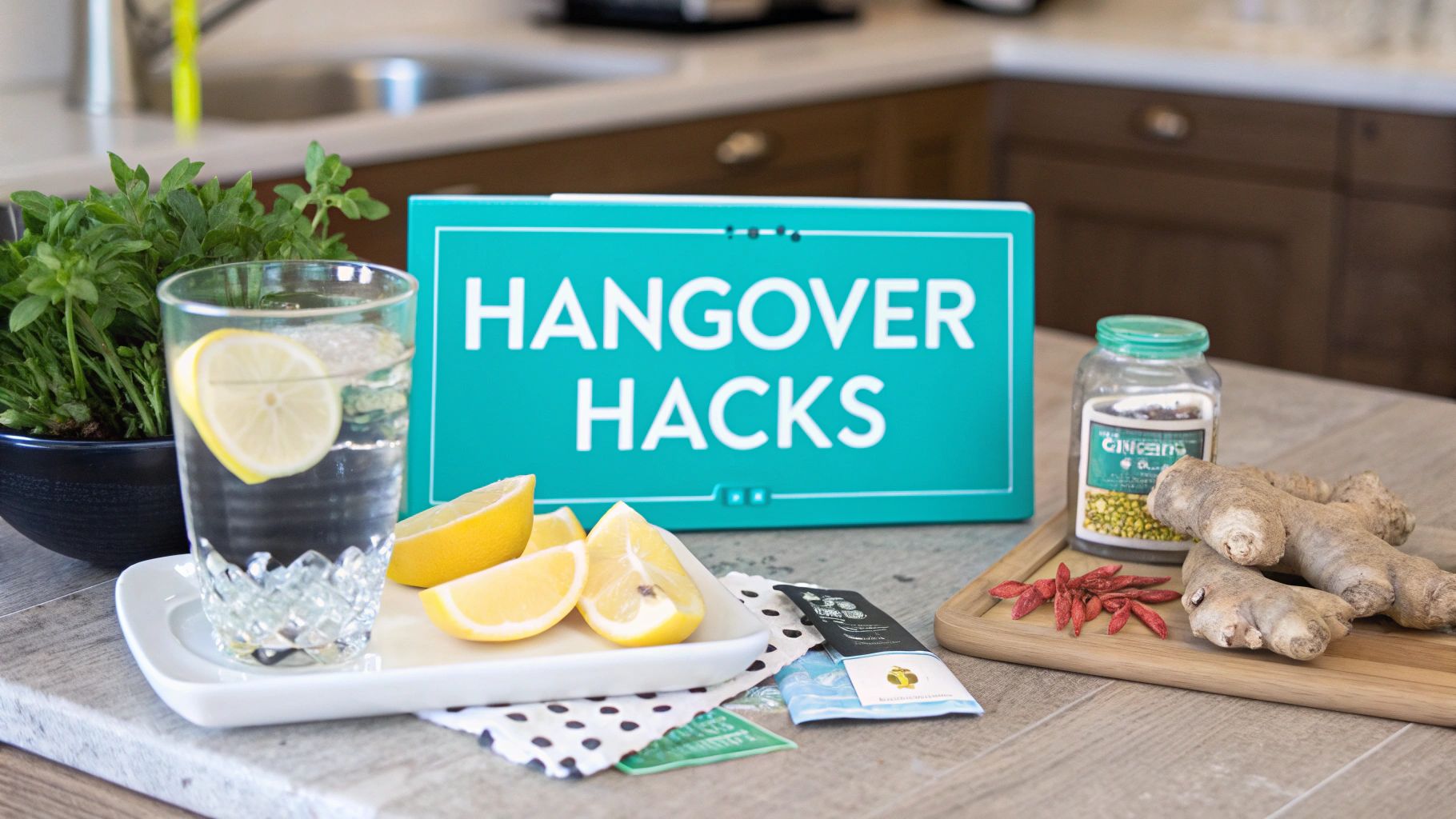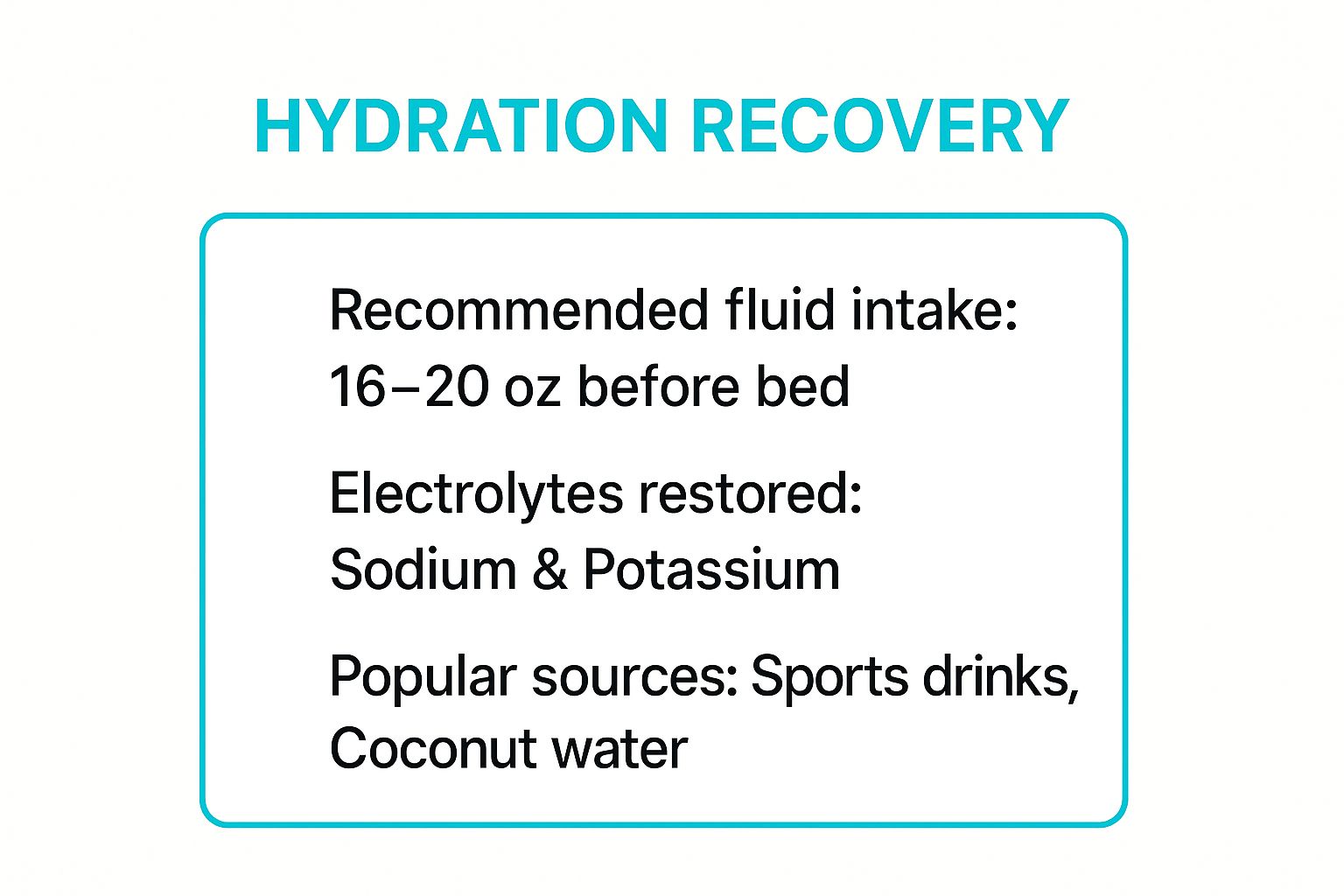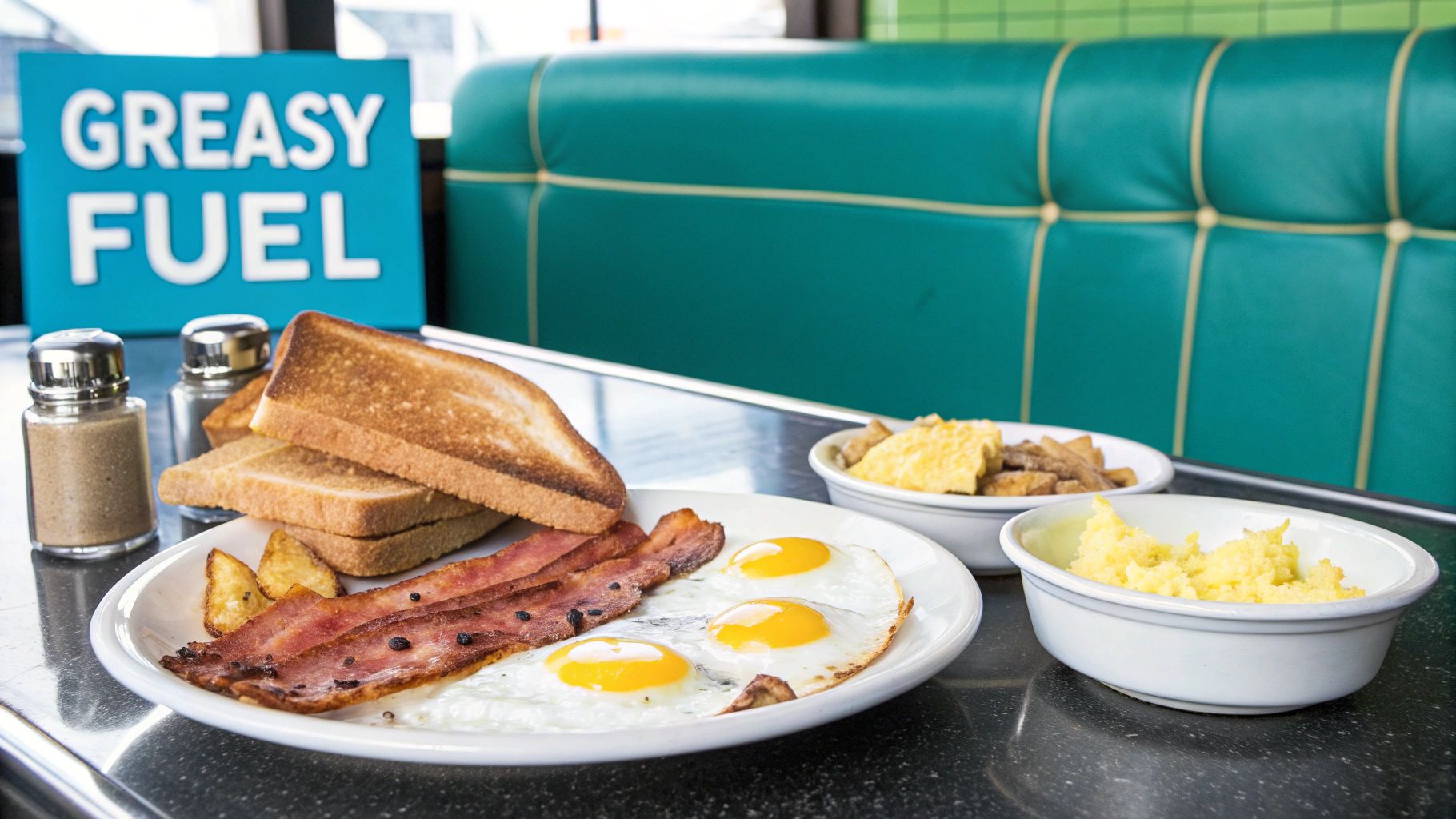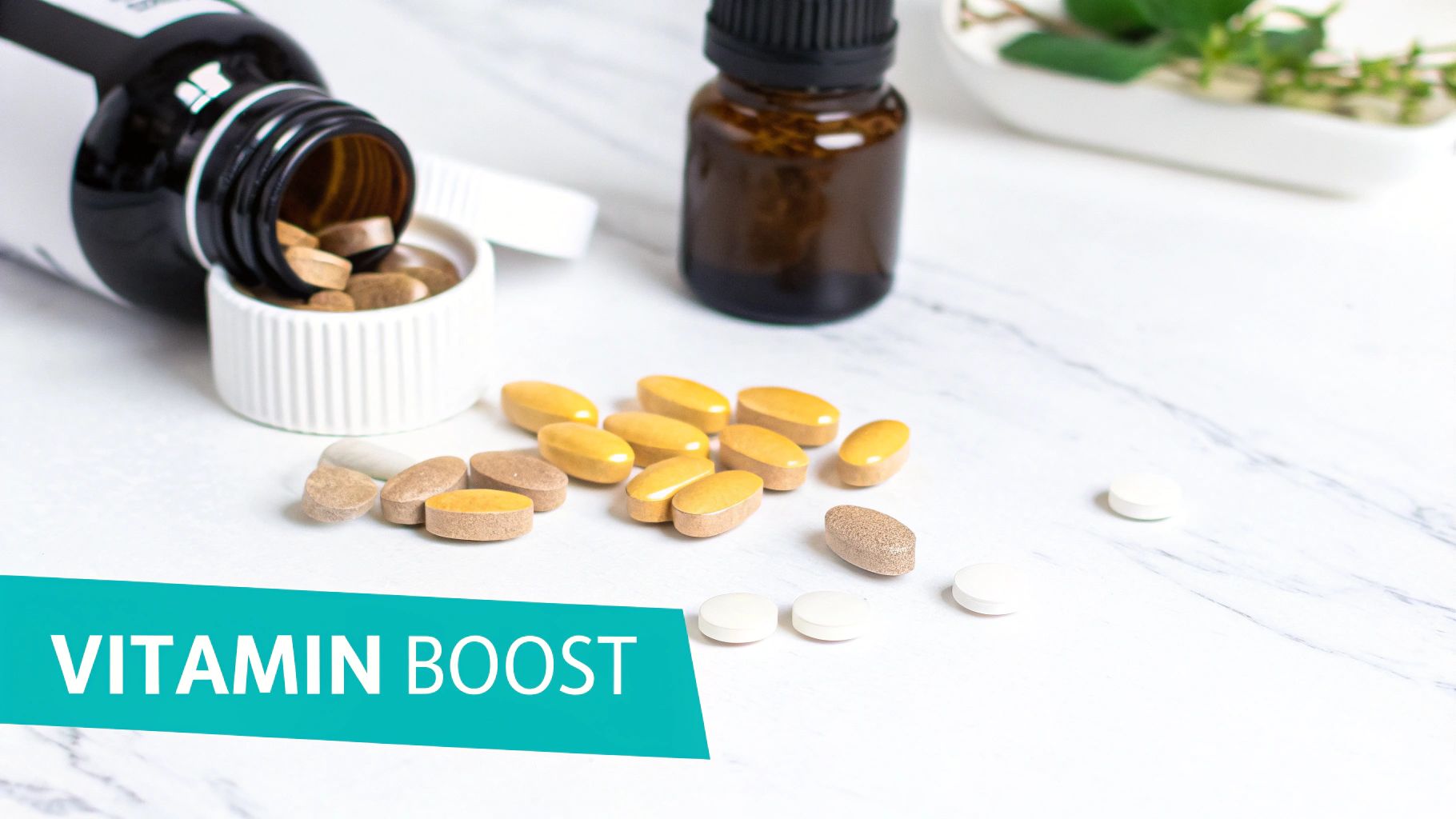

· By Annemarie
8 Best hangover cures You Should Know
Getting Started
Waking up with a pounding head and queasy stomach after a night out? You're not alone. Hangovers are a common, albeit unpleasant, experience. This listicle explores the best hangover cures, providing actionable strategies to alleviate your symptoms and get you back on your feet. We'll delve into proven remedies, debunk common myths, and offer fresh perspectives on how to tackle that morning-after misery.
This isn't just a list of generic hangover advice. We'll go beyond the typical "drink water" tip and explore the science behind effective hangover cures. You'll discover why certain remedies work, how to implement them effectively, and what to avoid. Whether you're a social drinker, a nightlife enthusiast, or just someone who occasionally overindulges, this guide offers practical solutions for minimizing the impact of a hangover.
We'll cover a range of effective strategies, including:
- Hydration and Electrolyte Balance: Learn the best way to replenish fluids and essential minerals lost during alcohol consumption.
- Dietary Approaches: Explore the science behind "greasy food" remedies and discover healthier dietary strategies.
- Rest and Recovery: Understand the vital role of sleep in overcoming a hangover.
- Caffeine Strategies: Discover how coffee can help and when it can hinder recovery.
- Vitamins and Supplements: Learn which supplements may offer relief and which ones to avoid.
- Exercise and Physical Activity: Explore the potential benefits (and drawbacks) of sweating it out.
- Natural Remedies: Investigate the effectiveness of ginger and other anti-nausea solutions.
- "Hair of the Dog": We'll examine the pros and cons of this controversial approach to hangover cures.
If you're searching for the best hangover cures, this comprehensive guide offers evidence-based strategies and practical tips to help you conquer the morning after and reclaim your day.
1. Hydration and Electrolyte Replacement
The most fundamental hangover cure revolves around addressing the core issue: dehydration and electrolyte imbalance. Alcohol's diuretic properties flush essential fluids and minerals from your system, leaving you feeling depleted. This is why rehydration is the cornerstone of effective hangover recovery. This method involves replenishing lost fluids and electrolytes through various means, alleviating common hangover symptoms like headache, fatigue, and nausea. Replenishing these lost resources is crucial for bouncing back.
This isn't just about chugging water. It's about strategic hydration and electrolyte replacement. Think of it like refueling your body after a strenuous workout. Sports medicine professionals have long understood the importance of electrolyte balance, and this knowledge has crossed over into hangover recovery. Examples of this shift include the increasing popularity of Pedialyte for adult hangover recovery and the rise of IV drip bars in major cities offering specialized hangover treatments. Even coconut water, a natural electrolyte source, has gained recognition as a valuable hangover remedy.
Actionable Tips for Hydration and Electrolyte Replacement
Here's how to put this into practice:
- Pre-Hydration: Drink 16-20 oz of water before going to bed after a night of drinking. This preemptive strike can significantly lessen the severity of your hangover.
- Pace Yourself: Alternate alcoholic beverages with water throughout the night to maintain hydration levels.
- Electrolyte Boost: Choose beverages rich in natural electrolytes like coconut water.
- DIY Electrolyte Drink: A pinch of salt and a squeeze of lemon added to water creates a simple, homemade electrolyte solution.
The infographic below summarizes these key hydration recovery tactics for quick reference.

As this summary box illustrates, preemptive hydration and electrolyte replenishment using readily available drinks can make a substantial difference. This approach offers a practical, accessible solution. For a deeper understanding of the science behind hangovers, learn more about what causes them.
Why This Method Works
This approach tackles the root cause of many hangover symptoms. IV therapy clinics like IVMe and Hangover Club capitalize on this principle by offering rapid rehydration and electrolyte replenishment, highlighting the effectiveness of this approach. Even medical professionals advocate for using Pedialyte to address dehydration.
This video further explores the science behind hydration and its importance for overall health, including recovery from a night of drinking. This best hangover cure deserves its spot on this list because it addresses the physiological effects of alcohol directly, offering a proven and effective way to mitigate the unpleasant after-effects.
2. The Greasy Food Method
The "greasy food method" is a time-honored hangover cure, often touted as a way to absorb alcohol and stabilize blood sugar levels. This method relies on the idea that fats can slow alcohol absorption and provide sustained energy to combat hangover fatigue. Popular choices for this method often include bacon, eggs, burgers, pizza, and other similar comfort foods. These foods offer a satisfying and potentially beneficial way to address hangover symptoms.

This approach is deeply rooted in cultural traditions surrounding food and drink. Think of the full English breakfast as a classic hangover cure, or American diner culture promoting hearty breakfasts after a night out. Even fast food chains like McDonald's often become popular hangover destinations. This widespread practice suggests a potential benefit to consuming greasy foods after drinking.
Actionable Tips for the Greasy Food Method
Here's how to use this method effectively:
- Start Small: Begin with smaller portions to test your stomach's tolerance. A full plate of greasy food might exacerbate nausea if your stomach is already sensitive.
- Include Eggs: Eggs contain cysteine, an amino acid that may help process toxins. This added benefit makes them a particularly good choice for a hangover breakfast.
- Balance It Out: Pair greasy foods with lighter options like toast or crackers to provide some balance and aid digestion.
- Avoid if Nauseous: If you're experiencing severe nausea or stomach upset, avoid greasy foods altogether. They could worsen your symptoms.
Why This Method Works (or Doesn't)
While the science behind this method is debated, some believe the fat content helps slow the absorption of alcohol. Others suggest it's the comfort and calorie boost that provide relief. The sustained energy from fatty foods could help combat fatigue, a common hangover symptom. This method deserves its place on the list due to its widespread popularity and anecdotal evidence of its effectiveness. It's a culturally ingrained practice that offers comfort and potential relief. For some, it may be just the ticket to bouncing back after a night of drinking. However, remember to listen to your body and avoid this method if it makes you feel worse. This method highlights the importance of personal preference when it comes to best hangover cures.
3. Sleep and Rest Recovery
One of the best hangover cures is often the simplest: sleep and rest. This natural method centers around allowing your body the time it needs to recover from the physiological stress of alcohol consumption. Alcohol disrupts sleep patterns, specifically REM cycles crucial for restorative rest. Extended sleep helps your body metabolize remaining alcohol, repair cellular damage, and restore normal brain function. This largely passive approach requires minimal intervention, primarily focusing on creating optimal sleep conditions.
The concept of recovery days, especially after a weekend of socializing, is becoming increasingly accepted. Hotels even cater to this need, with some offering late checkout options for guests recovering from a night out. Furthermore, sleep clinics are studying alcohol's impact on sleep quality, highlighting the connection between rest and recovery. This growing awareness underscores the importance of sleep in mitigating hangover symptoms.
Actionable Tips for Sleep and Rest Recovery
Here's how to maximize the benefits of sleep for hangover recovery:
- Create a conducive sleep environment: Ensure your bedroom is dark, cool, and quiet. Use blackout curtains, eye masks, and earplugs if necessary.
- Hydrate and snack strategically: Keep water and light snacks by your bedside to address potential dehydration and low blood sugar during the night.
- Minimize screen time before bed: Avoid screens and bright lights for at least an hour before sleep to promote melatonin production and improve sleep quality.
- Strategic sleeping position: If you're experiencing nausea, sleeping on your side can help prevent choking.
Why This Method Works
This approach leverages the body's natural healing mechanisms. By prioritizing sleep, you provide your system with the uninterrupted time required to process alcohol, repair cellular damage, and restore balance. This passive approach is often more effective than quick fixes, allowing for genuine recovery rather than just masking symptoms. Sleep medicine researchers, wellness advocates, and even medical professionals increasingly emphasize the power of natural healing through rest and sleep, especially in the context of alcohol recovery. This best hangover cure acknowledges that true recovery requires time and rest. It addresses the underlying issue of physiological stress caused by alcohol, offering a sustainable and effective path to feeling better.
4. Coffee and Caffeine Treatment
A popular hangover remedy, the coffee and caffeine treatment, uses caffeine to combat fatigue, improve alertness, and potentially alleviate headaches. Coffee, a readily available source of caffeine, contains antioxidants and may help constrict blood vessels, a factor contributing to hangover headaches. However, this method requires careful balance. Caffeine is also a diuretic and can worsen dehydration if not paired with adequate water intake.
This approach isn't just about grabbing any caffeinated beverage. It involves strategically using caffeine to address specific hangover symptoms while mitigating potential downsides. Think of it like targeted pain relief - addressing the throbbing headache while avoiding other complications. The widespread adoption of coffee as a morning ritual, particularly after a night out, demonstrates its perceived effectiveness in combating hangover fatigue. Examples include the Italian tradition of espresso as a post-indulgence pick-me-up and the anecdotal reports of increased coffee sales at cafes on weekend mornings. Even energy drink companies have tapped into this market, marketing products specifically for hangover recovery.
Actionable Tips for Coffee and Caffeine Treatment
Here's how to use caffeine effectively for hangover relief:
- Hydrate First: Drink a full glass of water before your coffee to counteract caffeine's diuretic effect.
- Moderate Intake: Start with a smaller cup of coffee to assess your stomach's tolerance.
- Gentle on the Stomach: Adding milk or cream can reduce acidity and soothe potential stomach upset.
- Green Tea Alternative: Consider green tea for a gentler caffeine source with added antioxidants.
- Avoid If Sensitive: Skip caffeine if you experience heart palpitations or severe anxiety.
Why This Method Works
This approach offers a targeted attack on some of the most debilitating hangover symptoms - fatigue and headache. While not a complete cure, it can provide much-needed relief. The widespread cultural acceptance of coffee as a morning ritual, especially after a night of drinking, speaks to its perceived efficacy. Many individuals find that a cup of coffee helps them "get going" after a night out, showcasing the stimulating power of caffeine. This makes coffee and caffeine treatment a valuable tool in the best hangover cures arsenal, particularly when used mindfully. It's about leveraging caffeine's benefits while minimizing its drawbacks through strategic hydration and moderate intake.
5. Vitamin and Supplement Therapy
A targeted approach to best hangover cures involves vitamin and supplement therapy. This method addresses nutritional deficiencies caused by alcohol consumption. Alcohol depletes essential nutrients, contributing to hangover symptoms. Replenishing these lost vitamins and minerals can significantly improve recovery. This approach focuses on B vitamins, vitamin C, magnesium, and other nutrients often depleted by alcohol, potentially supporting liver function and reducing inflammation.

Common supplements used for hangover recovery include B-complex vitamins, milk thistle, N-acetylcysteine, and specialized hangover prevention pills. Examples include DHM Detox and other specialized pills gaining popularity. Milk thistle supplements are often used for liver support, while B-complex vitamins are becoming a standard hangover remedy. Supplement companies like More Labs and Rally Labs, along with nutritionists and health influencers, have popularized this approach.
Actionable Tips for Vitamin and Supplement Therapy
Here's how to effectively use supplements for hangover recovery:
- Preemptive B Vitamins: Take a B-complex vitamin before drinking as a preventive measure.
- Quality Matters: Look for reputable, third-party tested supplement brands.
- Start Simple: Begin with basic vitamins before trying expensive specialized products.
- Consult a Professional: Talk to your healthcare provider if you are taking other medications.
- Optimal Absorption: Take supplements with food to improve absorption and reduce potential stomach irritation.
Learn more about essential vitamins to take for hangover relief to develop a personalized strategy.
Why This Method Works
This approach addresses the underlying nutritional deficiencies contributing to hangover symptoms. It provides the body with the necessary building blocks to recover more efficiently. By supporting liver function and reducing inflammation, vitamin and supplement therapy can alleviate the severity and duration of a hangover. This proactive strategy offers a valuable addition to the arsenal of best hangover cures.
6. Exercise and Sweat It Out Method
The "sweat it out" approach to hangover recovery is a somewhat controversial method involving light to moderate physical activity. Proponents believe exercise increases circulation, promoting toxin elimination through sweat and releasing endorphins. These endorphins supposedly counteract hangover depression and fatigue. However, this method requires careful consideration of your hydration status and overall physical condition. Pushing yourself too hard can worsen dehydration and exacerbate symptoms.
This method has gained traction within various fitness communities. Yoga studios offer hangover recovery classes, gyms promote workout-based hangover cures, and running clubs organize "recovery runs" after social events. The idea is to invigorate the body and mind, flushing out toxins and boosting mood through physical exertion. This approach aligns with the broader wellness trend of using exercise to address various health concerns.
Actionable Tips for Exercising with a Hangover
Here's how to safely incorporate exercise into your hangover recovery:
- Hydration is Key: Drink plenty of water before, during, and after exercise. Dehydration is a primary hangover symptom, and exercise can worsen it if you're not careful.
- Start Slow: Begin with gentle activities like walking or light yoga. Avoid intense workouts that could strain your already depleted system.
- Listen to Your Body: Stop immediately if you feel dizzy, nauseous, or unwell. A hangover is a sign your body needs rest, so don't push it too hard.
- Fresh Air is Your Friend: Consider outdoor activities for the added benefit of fresh air and sunlight, which can improve mood and energy levels.
This method isn't for everyone. It's best suited for mild hangovers and individuals who are generally physically fit and accustomed to regular exercise. It's crucial to prioritize hydration and listen to your body's signals.
Why This Method Might Work
This approach aims to boost circulation and endorphin release, potentially alleviating some hangover symptoms. While the science behind "sweating out toxins" is debatable, the psychological benefits of exercise can be significant. Improved mood and reduced fatigue can contribute to a faster perceived recovery. It's important to note that this is not a quick fix, and overexertion can be counterproductive. This method deserves its place on the list as a potential option for some, but it should be approached with caution and a focus on overall well-being.
7. Ginger and Anti-Nausea Remedies
A natural approach to best hangover cures focuses on combating nausea and digestive discomfort. This method utilizes ginger and other anti-nausea compounds to soothe the stomach. Ginger has well-documented anti-nausea properties and can help settle the stomach, making it easier to consume other helpful remedies like water and food. This is crucial for overall hangover recovery. This often includes ginger tea, crystallized ginger, or ginger capsules.
Ginger's use for digestive issues is well-established, particularly in traditional Chinese medicine. Its effectiveness has led to ginger ales and teas being marketed specifically for hangover relief. Even motion sickness remedies containing ginger are sometimes repurposed for hangovers, showcasing its versatility. This widespread use speaks volumes about ginger's efficacy in relieving nausea.
Actionable Tips for Using Ginger
Here's how to incorporate ginger into your hangover recovery plan:
- Ginger Tea: Try ginger tea with honey for palatability and additional soothing benefits.
- Start Small: Begin with small amounts of ginger to test your tolerance, especially if you have a sensitive stomach.
- Crystallized Ginger: Crystallized ginger can be easier to consume when experiencing nausea.
- Peppermint Combo: Combine ginger with peppermint for enhanced anti-nausea effects.
- Ginger Capsules: Keep ginger capsules on hand for a convenient and portable option.
This natural remedy has been popularized by traditional medicine practitioners and natural health advocates for centuries. Companies like Traditional Medicinals and Celestial Seasonings also offer readily available ginger-based products, further contributing to its popularity. Learn more about ginger and anti-nausea remedies for specific nausea-fighting tips.
Why This Method Works
This approach targets a specific and often debilitating aspect of hangovers: nausea. By addressing nausea directly, it allows for easier rehydration and food consumption, both essential for recovery. This focus on digestive comfort makes it a valuable addition to any hangover recovery strategy. This makes it a valuable component of a comprehensive approach to combating the best hangover cures.
8. Hair of the Dog (Controlled Alcohol Consumption)
The "hair of the dog" approach, involving consuming a small amount of alcohol the morning after, aims to temporarily alleviate hangover symptoms. This controversial method suggests that some hangover symptoms stem from mild alcohol withdrawal. A small dose of alcohol can briefly ease this transition as blood alcohol levels normalize. However, this method isn't medically recommended and carries potential risks. It should be approached with extreme caution.
Think of classic hangover brunch cocktails like the Bloody Mary. Its alcoholic component reflects this "hair of the dog" principle. Similarly, Micheladas and beer-based hangover drinks in some Latin American cultures demonstrate this tradition. Even classic cocktails like the Prairie Oyster, often touted as a hangover cure, incorporate a raw egg and Worcestershire sauce along with a shot of liquor. These examples showcase the cultural prevalence of this approach, highlighting its historical roots.
Actionable Tips for "Hair of the Dog"
If considering this method, proceed with caution and moderation:
- Limit Consumption: If used, keep the amount very small - a fraction of what was consumed the night before. Overdoing it will worsen the eventual hangover.
- Lower Alcohol Content: Opt for lower-alcohol beverages like beer or wine rather than hard liquor.
- Food and Water are Essential: Consume food and water alongside any alcohol to mitigate its effects. Never use this method on an empty stomach.
- Absolutely No Driving: Avoid driving or operating machinery after using this method. Even small amounts of alcohol can impair function.
- Last Resort Only: Consider "hair of the dog" as a last resort and not a regular hangover strategy. Repeated use can contribute to alcohol dependence.
Why This Method Might Work (But Shouldn't Be Your Go-To)
The "hair of the dog" method provides temporary relief by briefly delaying withdrawal symptoms, not curing the hangover. This masks the problem, ultimately prolonging recovery. While it might offer a short reprieve, it's not a sustainable solution. The temporary relief can be appealing, but it comes at a cost.
This approach deserves a spot on this list due to its cultural prevalence and the temporary relief it can provide. However, it's crucial to understand its limitations and potential risks. It's not a recommended best practice for hangover cures due to the possibility of exacerbating the problem and contributing to unhealthy drinking patterns. There are far safer and more effective methods to address hangover symptoms.
Top 8 Hangover Cure Methods Comparison
| Method | Implementation Complexity 🔄 | Resource Requirements ⚡ | Expected Outcomes 📊 | Ideal Use Cases 💡 | Key Advantages ⭐ |
|---|---|---|---|---|---|
| Hydration and Electrolyte Replacement | Low - easy to start anytime | Low to moderate (water to IV therapy) | Restores fluids and electrolytes, alleviates symptoms | Immediate and proactive recovery | Scientifically proven, affordable, no side effects |
| The Greasy Food Method | Low - simple meal prep | Low (common foods) | May stabilize blood sugar, provide energy | Mild hangovers, nausea relief | Familiar, accessible, energy-providing |
| Sleep and Rest Recovery | Very low - passive approach | None | Natural detox, cellular repair, symptom reduction | When time allows for extended rest | Natural, cost-free, addresses multiple symptoms |
| Coffee and Caffeine Treatment | Low - readily available beverage | Low (coffee or caffeine products) | Improves alertness, may reduce headaches | Fatigue and low alertness | Quick cognitive boost, headache relief potential |
| Vitamin and Supplement Therapy | Moderate - requires planning | Moderate to high (cost/quality varies) | Addresses nutritional deficiencies, supports liver | Preventive and recovery phases | Targets root deficiencies, some scientific support |
| Exercise and Sweat It Out Method | Moderate - careful hydration needed | Low to moderate (exercise space/equipment) | Boosts mood and circulation, speed recovery | Mild hangovers with adequate hydration | Mood improvement, energy boost |
| Ginger and Anti-Nausea Remedies | Low - simple to consume | Low (tea, capsules, candy) | Reduces nausea and stomach upset | Nausea-focused symptom relief | Natural, safe, allows other remedies intake |
| Hair of the Dog (Controlled Alcohol Consumption) | Moderate - requires caution | Low (small alcohol amount) | Temporary symptom relief, delays hangover effects | Social settings needing quick relief | Temporary relief, culturally entrenched |
Final Thoughts
Navigating the aftermath of a celebratory night can be challenging. This guide has explored some of the best hangover cures, ranging from classic remedies to scientifically-backed approaches. Finding what works best for you often involves a bit of experimentation. Remember, consistency in your approach is key.
Key Takeaways for Conquering Hangovers
Let's recap the essential strategies for tackling that dreaded hangover:
- Prioritize Hydration: Replenishing lost fluids and electrolytes is crucial. Water, sports drinks, and electrolyte solutions can help restore your body's balance.
- Nourishment Matters: While the "greasy food" myth persists, focusing on nutrient-rich foods can provide sustained energy and aid recovery.
- Rest and Recover: Sleep is essential for your body to process and eliminate toxins. Prioritize getting adequate rest after a night out.
- Strategic Caffeine Use: While coffee can provide a temporary boost, be mindful of its diuretic effects. Combine it with proper hydration.
- Targeted Supplements: Certain vitamins and supplements, like vitamin B and ginger, may offer additional support.
- Movement and Recovery: Light exercise can improve circulation and potentially alleviate some hangover symptoms.
- Nausea Management: Ginger and other anti-nausea remedies can help settle your stomach.
Implementing Your Hangover Strategy
Putting these best hangover cures into practice requires a personalized approach. Consider your individual needs and preferences. Experiment to discover what combination of strategies works best for you. Perhaps you find that electrolyte drinks combined with a light breakfast and some ginger tea offer the most relief. Or maybe a good night's sleep and a brisk walk are your go-to remedies.
The Value of Effective Hangover Management
Mastering these hangover cures empowers you to reclaim your day after a night of fun. Instead of being sidelined by discomfort, you can return to your normal activities feeling refreshed and energized. By understanding how your body responds to alcohol and implementing effective strategies, you can minimize the negative impacts and enjoy a more balanced lifestyle.
Finding the right approach to hangover recovery can significantly impact your well-being and productivity. Don't let a hangover dictate your day. Take control and implement the strategies that best suit your needs.
If you're looking for a convenient and effective way to support your body's natural recovery process, consider trying Upside Hangover Sticks. These portable sticks are packed with essential vitamins, electrolytes, and antioxidants to help combat hangover symptoms. Learn more and get yours today at Upside Hangover Sticks.
